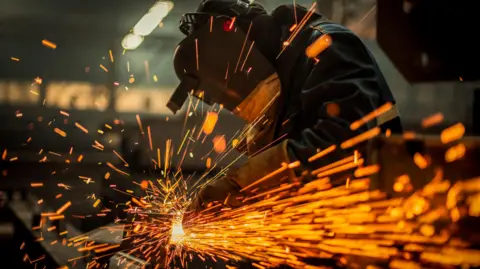Nippon and US Steel sue government over blocked deal
 Getty Images
Getty ImagesNippon Steel and US Steel are suing the US government over blocking a takeover, claiming that President Joe Biden "ignored the rule of law to gain favor" with trade unions.
The two companies also alleged that Biden, who is entering the last weeks of his presidency, stopped Nippon Steel buying US Steel to pursue his own political agenda.
In rejecting the proposed deal on Friday, President Biden said a strong domestically-owned steel industry was essential for national security and resilient supply chains, including for the car and defence industries.
If the $14.9bn (£11.8bn) takeover went ahead, it would strengthen Nippon's ability to compete with China, which produces 60% of the world's steel.
The White House defended the decision, claiming that foreign ownership of US Steel presented a national security risk.
The takeover has been in limbo since it was first announced in December 2023.
Biden's decision to officially block the deal delivered on a political promise made during last year's election - US Steel is based in swing state Pennsylvania - despite concerns it could chill foreign investment and roil relations with key ally Japan.
Nippon Steel and US Steel said Biden voiced his opposition before a formal formal review of the purchase by the government even began, in an effort to "curry favor" with a trade union during his re-election bid.
They asked the court to order a new review, alleging that the process overseen by the Committee on Foreign Investment in the US, which has the power to vet foreign takeovers of US firms, had been "manipulated" to support Biden's stance.
"As a result of President Biden's undue influence to advance his political agenda, the Committee on Foreign Investment in the US failed to conduct a good faith, national security-focused regulatory review process," claimed Nippon Steel and US Steel.
Additionally, the companies are suing the president of the United Steelworkers trade union, David McCall, and the chief executive of rival steel firm Cleveland-Cliffs, Lourenco Goncalves, for "their illegal and coordinated actions aimed at preventing the transaction".
Mr McCall, who had supported a $7.3bn takeover offer from Cleveland Cliffs in summer 2023, said the accusations were "baseless" and repeated his support of Biden's decision.
"By blocking Nippon Steel's attempt to acquire US Steel, the Biden administration protected vital US interests, safeguarded our national security and helped preserve a domestic steel industry that underpins our country's critical supply chains," he said.
Nippon Steel and US Steel said they have "engaged in good faith with all parties" to show how the deal "will enhance, not threaten, US national security" and how it would strengthen America's domestic steel industry "against the threat from China".
They also reiterated that Nippon was prepared to invest $2.7bn in Pittsburgh-based US Steel.
Earlier on Monday, Japan's Prime Minister Shigeru Ishiba expressed his concerns about the US decision to block the takeover and the impact it might have on trade relations between the two G7 countries.
"Unfortunately, it is true that we have heard concerns voiced by the Japanese industries over future investments between Japan and the US. We must view this issue as a grave matter," Mr Ishiba said.
He added that while it was inappropriate for his government to comment on individual companies: "We must insist on an explanation as to why there are security concerns, otherwise there will be no progress in future discussions."
Since 1990, the US has blocked just eight foreign takeover deals - most in the last decade and involving firms from China.
The lawsuit could leave the fate of the deal in the hands of the next administration, where some experts have said it could get a more favourable second hearing.
But President-elect Donald Trump has also said he would block the deal. On Monday, he wrote on Truth Social: "Why would they want to sell US Steel now when tariffs will make it a much more profitable and valuable company?"
Trump has said he plans to enact sweeping tariffs, which make imports into the US more expensive.
He has said the measures, which he also deployed during his first term, will make it easier for US-based companies to compete with overseas rivals and spur a manufacturing boom, increasing demand for steel.
According to economic analyses, the tariffs on foreign steel that he unveiled in 2018 led to modest job gains at steel-makers but job losses at other manufacturing companies that were forced to contend with higher steel costs.
